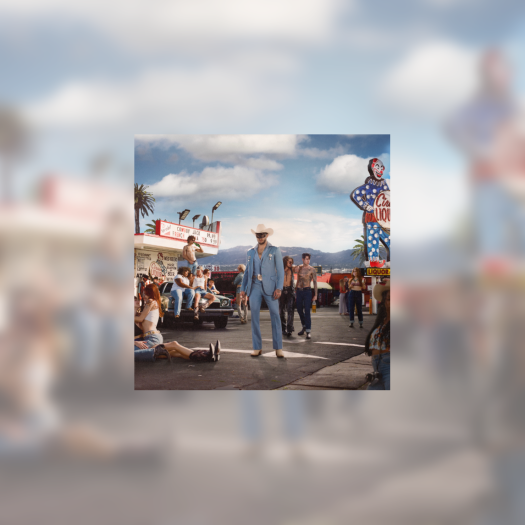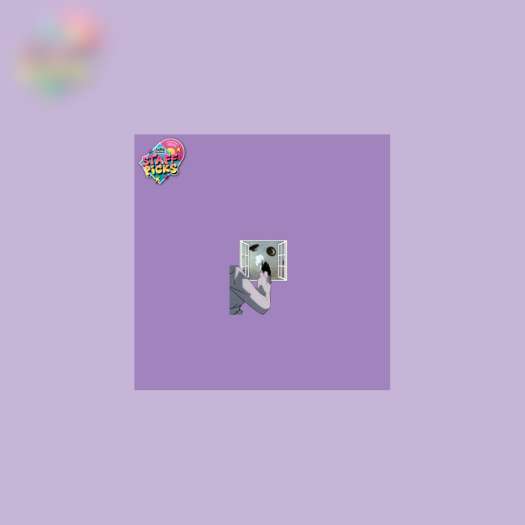Malajube's Trompe-l'œil fits right in with many other indie rock records that came out of Montreal in the mid-'00s. It takes the elements of rock music and squishes them together into a raucous mix of shouted vocals, urgent guitars and dynamics that change on a dime. It sounds like it could've been made by 20 players or three, and stands tall among the work of the city's titans that paved the way in the previous years, like the Unicorns, Arcade Fire and Wolf Parade.
And yet, its success became an exception, not the rule, when it came to Francophone music in the greater reaches of English-speaking Canada.
Trompe-l'œil, Malajube's sophomore album, was released 15 years ago, on February 7, 2006. Taking the energetic, baroque punk sound of the band's 2004 debut, Le compte complet, and bringing hi-fi studio sheen, Trompe-l'œil's mythos grew over the course of the year, turning the quartet into accidental ambassadors of a Francophone rock scene that saw little attention outside of Quebec and Europe, earning attention from international publications including The New York Times, Vanity Fair, Spin and Pitchfork. The accolades rolled in at home, too — they won Best New Artist at the 2006 ADISQ gala, and were the only Francophone act to make it to the inaugural Polaris Music Prize shortlist.
But what should have, in theory, been a wall-shattering moment for the divided music industries that touch — but rarely converge — in Montreal was instead a fleeting dream of what could have been. In the decade-and-a-half since Trompe-l'œil emerged in a burst of hollers, hooks and riffs, and though musicians across the globe have become more connected than ever thanks to further dependence on the internet, language remains a barrier for French-Canadian acts in breaking through to the rest of the country.
But it wasn't a problem for Malajube. "Apart from talking to the audience in a different language, there was no difference," says drummer Francis Mineau now about the band's live shows, speaking to Exclaim! over email via a translator. "There were good nights, good shows, okay shows, bad shows and magical moments, but it all depended on many factors that weren't related to language."
This all further begs the question, how did Malajube do it?
The reason is, at its core, is that the music expertly blends the cacophonous indie rock stylings of the era's biggest Canadian breakouts with Francophone musical traditions, a rare album that pairs Broken Social Scene-style arrangements — where vocals were but one of many elements woven in and out of the mix, serving more as a conduit for emotion rather than as a commanding force that sat above the instruments — with lush, Harmonium-esque acoustic sounds. It hit on the uncanny, world-beating notes that made many of Malajube's contemporaries globally recognized superstars while keeping their Quebecois roots up front.
The eclectic styles covered throughout the album add up to a fully realized work that remains exciting to listen to 15 years later, from bouncing pop-rocker "Montréal -40°C" and mid-tempo anthem "Pâte Filo" to hip-hoppin' interlude "La russe" and romantic slow burner "Étienne d'Août." Even today, "La fin" continues to merit seven minutes of silence after its cathartic conclusion before the album's untitled, acoustic maelstrom of a finale emerges. (It's a move that certainly doesn't play well in today's playlist driven, melody-all-the-time landscape.)
As Mineau puts it now, Trompe-l'œil stands out due to "its amazing controlled aggressiveness, its unpredictability, its lo-fi touch, and all its heavy metal riffs!"
The success of Trompe-l'œil made a potential Francophone boom seem like more of an inevitability, though it took a few years. (The Francophone album that followed Trompe-l'œil onto the Polaris shortlist? Malajube's Labyrinthes in 2009.) Acts like Radio Radio, Galaxie, Karkwa and Monogrenade began to poke through, culminating in a Polaris Music Prize win for Karkwa in 2010 for their album Les chemins de verre, to date the only Francophone act to do so.
In recent years, Coeur de pirate stands as the most sustained Francophone act in English Canada, having delivered chanteuse stylings to Anglophone audiences for a decade. Glam rocker Hubert Lenoir was poised for a breakout on the heels of his 2018 debut album, Darlène, but few audiences outside of Quebec were able to bear witness to his theatrical, transformative live shows. Montreal post-punks Corridor became the first Francophone act signed to mainstay American label Sub Pop, but beyond two short tours in North America and Europe in late 2019, the COVID-19 pandemic has denied the band a chance to grow their audience.
Despite having experienced it himself, Mineau remains unsure on the viability of Francophone bands breaking through to English-speaking audiences. Says Mineau, "The fact that a band is Francophone can create a buzz, a kind of curiosity, but I don't think that a Francophone band, or singer, could one day become as big as Coldplay… But I might be wrong."
If that act exists, it won't be Malajube. The band followed up Labyrinthes with La caverne in 2011, which turned out to be their final record. The quartet went on hiatus in 2012 and, with the exception of a single reunion show in 2015, have no plans to reunite. Most of the members remain active in the music industry: Mineau is currently working on a new album with his instrumental grunge band, Cantalou, along with producing new material by Hugo Mudie and Lucill (a.k.a. Raphael Bussieres of dormant Montreal rockers Heat); his cousin, vocalist Julien Mineau, produces and mixes, and keyboardist Thomas Augustin performs in punk collective Jesuslesfilles. (As for bassist Mathieu Cournoyer, says Francis, "Mathieu, honestly, I don't really know! He has a little dog!?")
But while Malajube's members have moved on, the impact of Trompe-l'œil remains musically exciting years later, like the thrashing climax of "Le crabe" and ol'-timey cabane à sucre stomp of "Ton plat favori." Those unfamiliar with the album have certainly heard its influence: Born Ruffians employed similarly chaotic rock stylings on their debut, 2008's Red, Yellow & Blue, while Hollerado have acknowledged aping the central riff of Malajube's "Étienne d'Août" for their track "Juliette."
Regardless of whether a Francophone band can be the next Coldplay, the door is still open for the next Malajube or Coeur de pirate. According to Francis, Trompe-l'œil succeeded because "the music that we made was innovative, or rather, unforeseen, spontaneous, like we just pulled it out of a hat, or from who knows where. It was young and fresh, pop and metal at the same time. it wasn't conventional or comfortable music." And though those artists are hard to predict and are just as likely to flash in the pan as they are to stick around, you never know when one will arrive next.
And yet, its success became an exception, not the rule, when it came to Francophone music in the greater reaches of English-speaking Canada.
Trompe-l'œil, Malajube's sophomore album, was released 15 years ago, on February 7, 2006. Taking the energetic, baroque punk sound of the band's 2004 debut, Le compte complet, and bringing hi-fi studio sheen, Trompe-l'œil's mythos grew over the course of the year, turning the quartet into accidental ambassadors of a Francophone rock scene that saw little attention outside of Quebec and Europe, earning attention from international publications including The New York Times, Vanity Fair, Spin and Pitchfork. The accolades rolled in at home, too — they won Best New Artist at the 2006 ADISQ gala, and were the only Francophone act to make it to the inaugural Polaris Music Prize shortlist.
But what should have, in theory, been a wall-shattering moment for the divided music industries that touch — but rarely converge — in Montreal was instead a fleeting dream of what could have been. In the decade-and-a-half since Trompe-l'œil emerged in a burst of hollers, hooks and riffs, and though musicians across the globe have become more connected than ever thanks to further dependence on the internet, language remains a barrier for French-Canadian acts in breaking through to the rest of the country.
But it wasn't a problem for Malajube. "Apart from talking to the audience in a different language, there was no difference," says drummer Francis Mineau now about the band's live shows, speaking to Exclaim! over email via a translator. "There were good nights, good shows, okay shows, bad shows and magical moments, but it all depended on many factors that weren't related to language."
This all further begs the question, how did Malajube do it?
The reason is, at its core, is that the music expertly blends the cacophonous indie rock stylings of the era's biggest Canadian breakouts with Francophone musical traditions, a rare album that pairs Broken Social Scene-style arrangements — where vocals were but one of many elements woven in and out of the mix, serving more as a conduit for emotion rather than as a commanding force that sat above the instruments — with lush, Harmonium-esque acoustic sounds. It hit on the uncanny, world-beating notes that made many of Malajube's contemporaries globally recognized superstars while keeping their Quebecois roots up front.
The eclectic styles covered throughout the album add up to a fully realized work that remains exciting to listen to 15 years later, from bouncing pop-rocker "Montréal -40°C" and mid-tempo anthem "Pâte Filo" to hip-hoppin' interlude "La russe" and romantic slow burner "Étienne d'Août." Even today, "La fin" continues to merit seven minutes of silence after its cathartic conclusion before the album's untitled, acoustic maelstrom of a finale emerges. (It's a move that certainly doesn't play well in today's playlist driven, melody-all-the-time landscape.)
As Mineau puts it now, Trompe-l'œil stands out due to "its amazing controlled aggressiveness, its unpredictability, its lo-fi touch, and all its heavy metal riffs!"
The success of Trompe-l'œil made a potential Francophone boom seem like more of an inevitability, though it took a few years. (The Francophone album that followed Trompe-l'œil onto the Polaris shortlist? Malajube's Labyrinthes in 2009.) Acts like Radio Radio, Galaxie, Karkwa and Monogrenade began to poke through, culminating in a Polaris Music Prize win for Karkwa in 2010 for their album Les chemins de verre, to date the only Francophone act to do so.
In recent years, Coeur de pirate stands as the most sustained Francophone act in English Canada, having delivered chanteuse stylings to Anglophone audiences for a decade. Glam rocker Hubert Lenoir was poised for a breakout on the heels of his 2018 debut album, Darlène, but few audiences outside of Quebec were able to bear witness to his theatrical, transformative live shows. Montreal post-punks Corridor became the first Francophone act signed to mainstay American label Sub Pop, but beyond two short tours in North America and Europe in late 2019, the COVID-19 pandemic has denied the band a chance to grow their audience.
Despite having experienced it himself, Mineau remains unsure on the viability of Francophone bands breaking through to English-speaking audiences. Says Mineau, "The fact that a band is Francophone can create a buzz, a kind of curiosity, but I don't think that a Francophone band, or singer, could one day become as big as Coldplay… But I might be wrong."
If that act exists, it won't be Malajube. The band followed up Labyrinthes with La caverne in 2011, which turned out to be their final record. The quartet went on hiatus in 2012 and, with the exception of a single reunion show in 2015, have no plans to reunite. Most of the members remain active in the music industry: Mineau is currently working on a new album with his instrumental grunge band, Cantalou, along with producing new material by Hugo Mudie and Lucill (a.k.a. Raphael Bussieres of dormant Montreal rockers Heat); his cousin, vocalist Julien Mineau, produces and mixes, and keyboardist Thomas Augustin performs in punk collective Jesuslesfilles. (As for bassist Mathieu Cournoyer, says Francis, "Mathieu, honestly, I don't really know! He has a little dog!?")
But while Malajube's members have moved on, the impact of Trompe-l'œil remains musically exciting years later, like the thrashing climax of "Le crabe" and ol'-timey cabane à sucre stomp of "Ton plat favori." Those unfamiliar with the album have certainly heard its influence: Born Ruffians employed similarly chaotic rock stylings on their debut, 2008's Red, Yellow & Blue, while Hollerado have acknowledged aping the central riff of Malajube's "Étienne d'Août" for their track "Juliette."
Regardless of whether a Francophone band can be the next Coldplay, the door is still open for the next Malajube or Coeur de pirate. According to Francis, Trompe-l'œil succeeded because "the music that we made was innovative, or rather, unforeseen, spontaneous, like we just pulled it out of a hat, or from who knows where. It was young and fresh, pop and metal at the same time. it wasn't conventional or comfortable music." And though those artists are hard to predict and are just as likely to flash in the pan as they are to stick around, you never know when one will arrive next.




